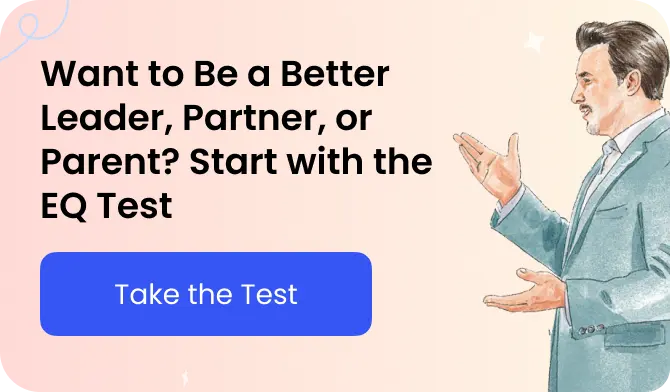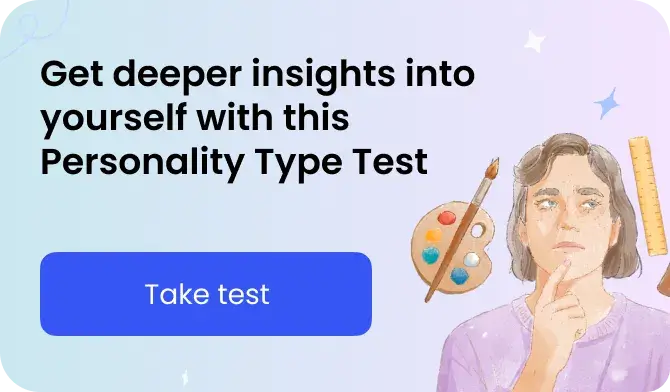People with strong friendships show higher levels of happiness and even better health, according to the American Psychological Association [1]. But do you know how close you really are with your friend? Take our quiz to find out.
True Friendship Quiz: Is Your Best Friend Really There for You?
To find out if someone is really your best friend, choose one answer in each question. Count 1 point for each “Yes” answer and 0 points for each “No” answer. Then, proceed to the results.
- Can you trust your friend with your secrets?
- Yes
- No
- Do they listen and offer emotional support when you need it?
- Yes
- No
- Do they encourage you in achieving your goals?
- Yes
- No
4. If you don’t talk for a while, does your friendship still feel meaningful?
- Yes
- No
5. Can they perceive when you’re upset, even if you don’t express it verbally?
- Yes
- No
6. Do they remember important things you’ve told them?
- Yes
- No
7. Do they initiate plans as often as you do?
- Yes
- No
8. Can you be your genuine self around them?
- Yes
- No
9. Do you often laugh and have fun together?
- Yes
- No
10. Does your friend respect your interests and views, even if they differ from their own?
- Yes
- No
11. Have they been there during tough times?
- Yes
- No
12. Are you comfortable in the company of their other friends?
- Yes
- No
13. Do they celebrate your wins?
- Yes
- No
14. If a conflict arises, are they willing to discuss it?
- Yes
- No
15. Do you feel comfortable saying “no” to them?
- Yes
- No
16. Can you admit your mistakes to them without fear of being judged?
- Yes
- No
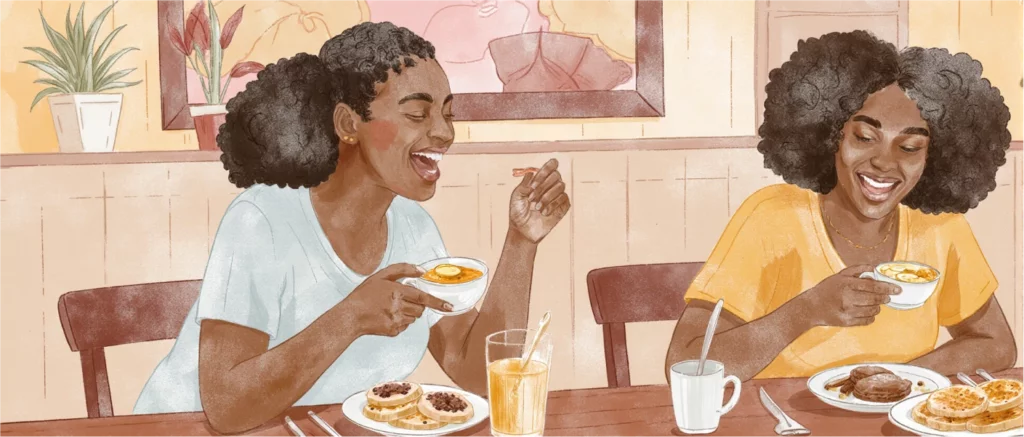
Friendship Quiz Results
13-16 Points: True Best Friend
According to your answers, it appears your relationship is based on trust and mutual respect. This person can support you without trying to fix or minimize your feelings. Your communication feels open and honest, and both of you feel safe sharing your thoughts and feelings without fear of vulnerability.
If you wonder how to get motivated, your best friend can inspire you to grow and become the best version of yourself. They are also there for you during challenging times and are always happy to celebrate your successes. You can rely on each other in any situation. This kind of best friend is rare and valuable.
9-12 Points: True Friendship
You have a good, dependable friend. They are your true friend who cares about you and shows up in meaningful ways. They are ready to listen when you need to talk and can offer you help. While there may be a few areas where the friendship could grow stronger, it’s built on a solid foundation. With mutual effort, this person can become your best friend.
Wondering how to be a better friend? Studies on emotion theory have found that people with higher levels of emotional intelligence are better at detecting people’s needs and offering them higher-quality advice and support [2]. Take an insightful emotional intelligence test!
5-8 Points: Growing Friendship
You can have a great time together, but there’s room for improvement if you want to become best friends. There may be areas where communication, trust, or effort could be stronger. Are both of you equally invested? Maybe you’re still learning to trust each other or discovering whether your values align. Try spending more intentional time together and having meaningful conversations, support each other, and see how the friendship grows.
Expert Insight
There are a couple of ways to navigate such challenges in a friendship. One would be to have a conversation with your friend to express how you feel and see if there is room to resolve it. Another strategy would be to assess how much you want to give if it’s not being reciprocated and adjust your expectations and output accordingly.
Hannah Schlueter
Mental health professional
0-5 Points: Potentially Unhealthy Friendship
Based on your answers, this person may not be the best friend you deserve. You may even wonder, “Why do I feel sad for no reason after talking to them?” or “Why do I feel guilty every time I’m around them?” It can also help to check in with yourself on whether this friendship energizes you or drains you, making you feel worthless, anxious or insecure. As this friendship may not be meeting your needs, it might be time to evaluate whether this person is truly a best friend or more of a casual acquaintance.
Wondering if you tend to be the toxic friend? Take a test to find out.
Looking for More Best Friend Quizzes And Tips for Your Mental Health?
If you’re trying to spot a narcissistic friend or looking for a tool to work on yourself and be emotionally available with close people, Breeze Wellbeing is your support:
1. Mood tracker to identify what triggers self-doubt or anxiety
In a toxic friendship, people might have difficulties setting boundaries, experiencing feelings of imbalance, and resentment. Among common toxic relationship signs are also a lack of trust, empathy, or respect. Ongoing relationships with such a friend may have a harmful effect on one’s mental health, according to research on toxic friendship [3].
You can try Breeze’s mood tracker to analyze your emotions daily, reflect on triggers of self-doubt, and see how your mood changes depending on the people and situations around you.
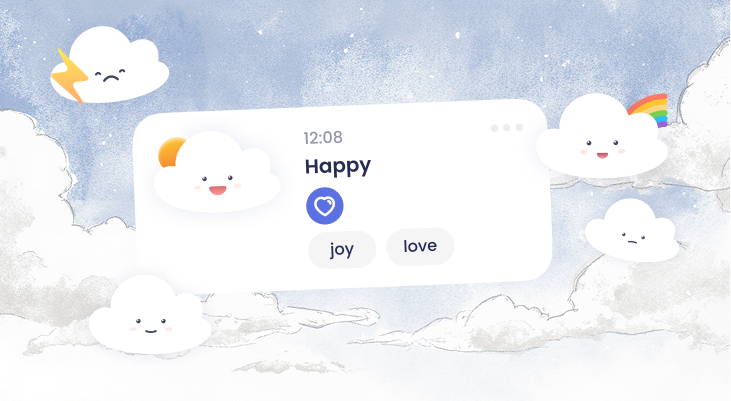
2. Guided journaling for exploring negative emotions
According to research on journaling, expressive writing has been linked to better coping with trauma or emotional difficulties [4]. Guided journaling allows you to describe your emotions and understand how to feel your feelings. For example, you might journal about a recent conflict with a friend: what happened, how it made you feel, how you reacted, and whether your feelings were influenced by past experiences. This practice can help you spot patterns, learn how to not take things personally, and better understand your own needs and boundaries.
Using Breeze guided journaling with self-reflection questions, you can structure your reflections, track emotional progress, and gain insights into your behavioral patterns that can help you respond thoughtfully instead of reacting impulsively.
3. Daily affirmations to boost your self-esteem
To increase your confidence and learn how to love yourself, try practicing saying good things about yourself. With Breeze positive affirmations, you can build kindness towards yourself and other people.
According to a study on self-related processing, affirmations activate parts of the brain linked to self-reflection and rewards, and it becomes even stronger when we focus on positive future goals [5]. With regular self-compassion, you may begin to feel worthy of care and love in friendship and romantic relationships. These exercises may also help you become more understanding of others and allow you more flexibility in how you respond to mistakes or other challenges.
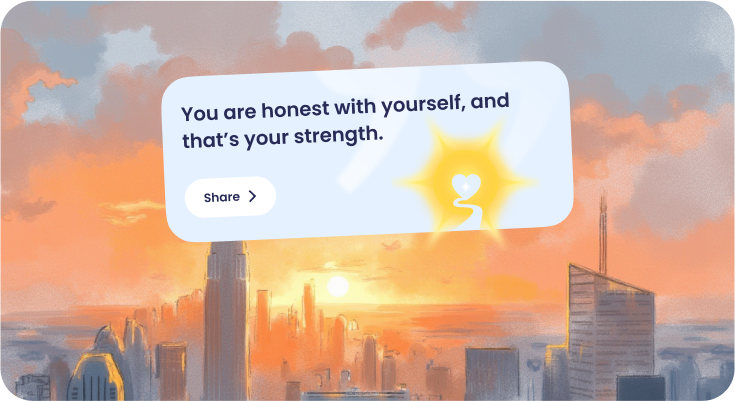
4. Insightful tests and fun quizzes
The Breeze app offers a variety of quizzes:
- Your attachment style to understand how you form relationships and treat close people.
- Career test to discover what path is right for you.
- Childhood trauma and how it affects your relationships in adult life.
- Your temperament helps you understand what drives your behavior.
- Your values help you discover the most important things and priorities in your life.
- A quiz to see if you’re ready for relationships and what you might be afraid of.
- How likable you are and many more.
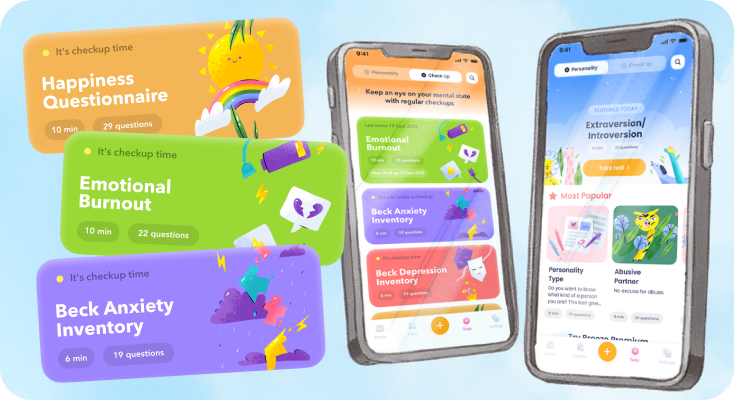
5. Profile summary
The Breeze profile summary gives you an overview of your personality, emotional patterns, habits, and personal growth. It compiles your mood tracking, journaling insights, and quiz results into one easy-to-read dashboard. All this allows you to understand your strengths, identify areas for improvement, and monitor progress.
With this feature, you can spot tendencies in your behavior and life choices, and receive personalized recommendations to improve your mental well-being and relationships.
6. Personalized routine plans to achieve your goals
Want to make friends as an adult or learn how to talk to anyone? Or, maybe you wonder how to control your emotions or how to change your life? Breeze personalized routines can help you set goals and track your progress. This feature offers you daily tips specifically for your needs.
For example, the routine might suggest conversation starters to practice social skills, mindfulness activities to reduce anxiety and ground yourself, or small daily tasks to build confidence. Eventually, these guided steps help you develop healthy habits, boost self-esteem, and move closer to the life and relationships you want.
Expert Insight
Talking with a professional can help you explore aspects of your friendships that are or are not helpful for you, what roles you play, and help you build more meaningful relationships. Therapy is a perfect place to practice and build social skills, such as assertive communication, interpersonal boundaries, conflict resolution, and emotional regulation. Overall, therapy is a huge asset for improving friendships and social skills.
Hannah Schlueter
Mental health professional
Sources
- Zara Abrams. The science of why friendships keep us healthy. June 2023.
- Izard CE. Emotion Theory and Research: Highlights, Unanswered Questions, and Emerging Issues. 2010.
- Suzanne Degges-White, Judy Pochel Van Tieghem. Toxic Friendships: Knowing the Rules and Dealing with the Friends Who Break Them. June 2015.
- Smyth JM, Johnson JA, Auer BJ, Lehman E, Talamo G, Sciamanna CN. Online Positive Affect Journaling in the Improvement of Mental Distress and Well-Being in General Medical Patients With Elevated Anxiety Symptoms: A Preliminary Randomized Controlled Trial. December 2018.
- National Library of Medicine. Self-affirmation activates brain systems associated with self-related processing and reward and is reinforced by future orientation. November 2015.
Disclaimer
This article is for general informative and self-discovery purposes only. It should not replace expert guidance from professionals.
Any action you take in response to the information in this article, whether directly or indirectly, is solely your responsibility and is done at your own risk. Breeze content team and its mental health experts disclaim any liability, loss, or risk, personal, professional, or otherwise, which may result from the use and/or application of any content.
Always consult your doctor or other certified health practitioner with any medical questions or concerns
Breeze articles exclusively cite trusted sources, such as academic research institutions and medical associations, including research and studies from PubMed, ResearchGate, or similar databases. Examine our subject-matter editors and editorial process to see how we verify facts and maintain the accuracy, reliability, and trustworthiness of our material.
Was this article helpful?


